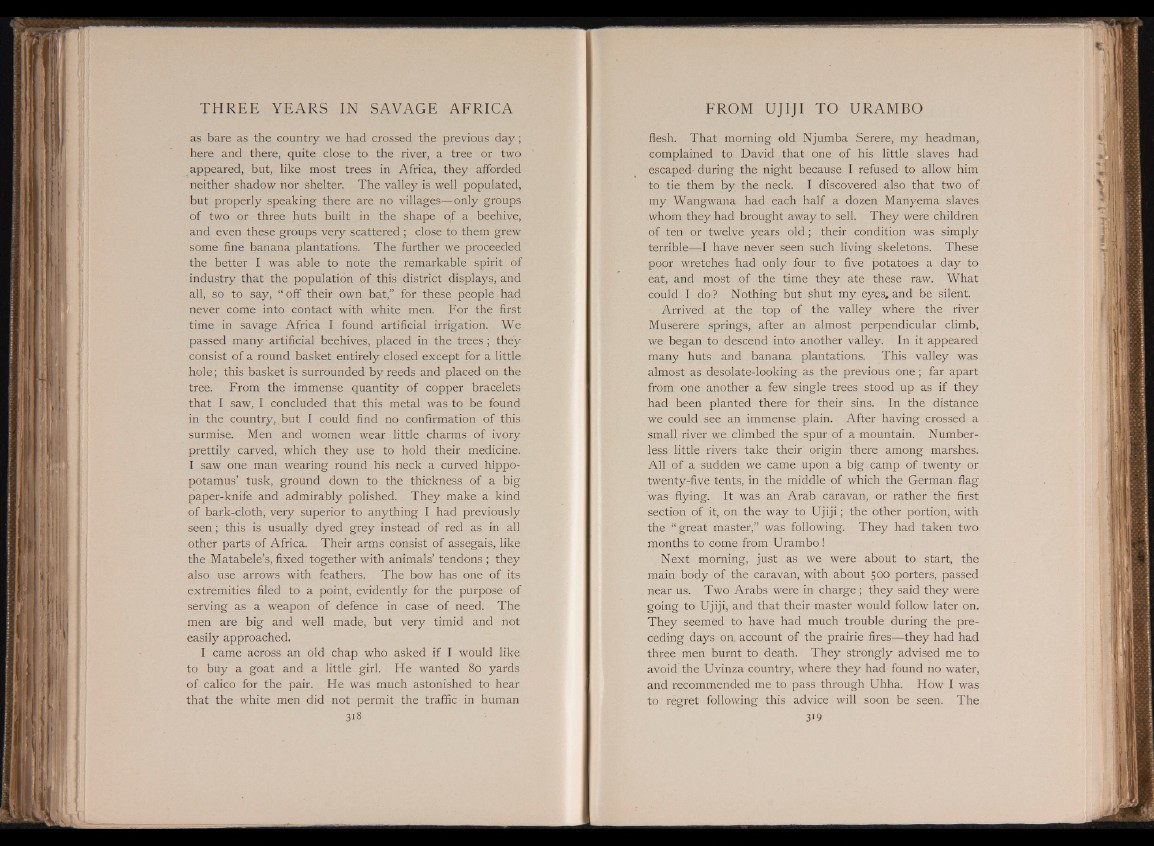
as bare as the country we had crossed the previous day;
here and there, quite close to the river, a tree or two
appeared, but, like most trees in Africa, they afforded
neither shadow nor shelter. The valley is well populated,
but properly speaking there are no villages—only groups
of two or three huts built in the shape of a beehive,
and even these groups very scattered ; close to them grew
some fine banana plantations. The further we proceeded
the better I was able to note the remarkable spirit of
industry that the population of this district displays, and
all, so to say, “ off their own bat,” for these people.had
never come into contact with white men. For the first
time in savage Africa I found artificial irrigation. We
passed many artificial beehives, placed in the trees; they
consist of a round basket entirely closed except for a little
hole; this basket is surrounded by reeds and placed on the
tree. From the immense quantity of copper bracelets
that I saw, I concluded that this metal was to be found
in the country, but I could find no confirmation of this
surmise. Men and women wear little charms of ivory
prettily carved, which they use to hold their medicine.
I saw one man wearing round his neck a curved hippopotamus’
tusk, ground down to the thickness of a big
paper-knife and admirably polished. They make a kind
of bark-cloth, very superior to anything I had previously
seen; this is usually dyed grey instead of red as in all
other parts of Africa. Their arms consist of assegais, like
the Matabele’s, fixed together with animals’ tendons ; they
also use arrows with feathers. The bow has one of its
extremities filed to a point, evidently for the purpose of
serving as a weapon of defence in case of need. The
men are big and well made, but very timid and not
easily approached.
I came across an old chap who asked if I would like
to buy a goat and a little girl. He wanted 80 yards
of calico for the pair. He was much astonished to hear
that the white men did not permit the traffic in human
318
flesh. That morning old Njumba Serere, my headman,
complained to David that one of his little slaves had
escaped- during the night because I refused to allow him
to tie them by the neck. I discovered also that two of
my Wangwana had each half a dozen Manyema slaves
whom they had brought away to sell. They were children
of ten or twelve years old; their condition was simply
terrible—I have never seen such living skeletons. These
poor wretches had only four to five potatoes a day to
eat, and most of the time they ate these raw. What
could I do? Nothing but shut my eyes.and be silent.
Arrived at the top of the valley where the river
Muserere springs, after an almost perpendicular climb,
we began to descend into another valley. In it appeared
many huts and banana plantations. This valley was
almost as desolate-looking as the previous one; far apart
from one another a few single trees stood up as if they
had been planted there for their sins. In the distance
we could see an immense plain. After having crossed a
small river we climbed the spur of a mountain. Numberless
little rivers take their origin there among marshes.
All of a sudden we came upon a big camp of twenty or
twenty-five tents, in the middle of which the German .flag
was flying. It was an Arab caravan, or rather the first
section of it, on the way to Ujiji; the other portion, with
the “ great master,” was following. They had taken two
months to come from Urambo!
Next morning, just as we were about to start, the
main body of the caravan, with about 500 porters, passed
near us. Two Arabs were in charge; they said they were
going to Ujiji, and that their master would follow later on.
They seemed to have had much trouble during the preceding
days on. account of the prairie fires—they had had
three men burnt to death. They strongly advised me to
avoid the Uvinza country, where they had found no water,
and recommended me to pass through Uhha. How I was
to regret following this advice will soon be seen. The